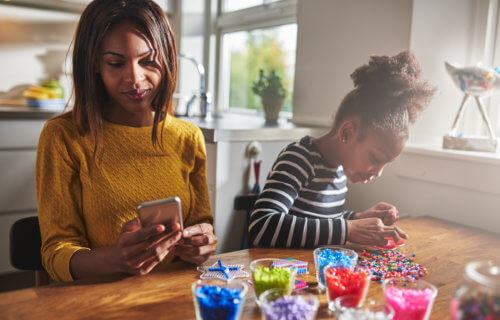JOONDALUP, Australia — It’s an image that’s become more and more common over the past decade. A child frantically tries to get their parent’s attention while mom or dad is staring at their smartphone. It’s a scenario that doesn’t exactly scream “parent of the year,” but according to a new study from Edith Cowan University, parental smartphone use is rarely ever a legitimate sign of a bad parent.
It may sound unbelievable, but researchers claims that smartphone use among parents is usually linked to warm and attached caregiving.
In all, 3,649 Australian parents filled out a series of surveys that tested 12 different aspects of smartphone use. The research team was interested in finding and analyzing any negative associations between parenting and using a smartphone. They couldn’t uncover a direct relationship.
Would refining their investigation make a difference? They theorized that smartphone use may only be detrimental to parenting if it cuts into valuable family time. Similarly, perhaps it may be more troubling if it becomes a source of tension/arguments between parent and child.
This thesis led them to the following finding: when a parent’s smartphone use doesn’t cut into family time all that often, a smartphone habit is actually linked to better, not worse parenting.
Smartphone use ‘essential for support’ for parents
These findings may puzzle many readers. How in the world does using a smartphone lead to better parenting? We’ve all become jaded at some point over time at the idea of smartphones. Still, it’s easy to forget that literally any piece of information we desire is just a few taps away. According to the study’s authors, smartphones often help parents connect with other parents, find parenting information quickly, and establish a support network.
“For parents, the smartphone is an essential link to the outside world for support, knowledge or to connect with others in similar situations,” explains study co-author Dr. Lynette Vernon of ECU in a release.
“Parental smartphone use has been demonized as a risk to families, by various sectors of the community and media,’’ adds lead researcher Dr. Kathryn Modecki, a member of Menzies Health Institute Queensland. “But across diverse family environments, smartphones play multiple roles in family life, including provision of social support and information, and allowing for work and digital errands. If phones are not heavily impacting on family time, smartphones tend to be tied to positive (and not negative) parenting.”
‘Moral panic about screen time’
The study’s authors mapped 84 different possible ways that smartphone use could influence a family’s wellbeing.
“There is a moral panic about screen time, but it would be naïve to ignore the online context where parents can be meaningfully assisted to gain information and support and where social relationships can unfold albeit via the smartphone platform,” comments co-author Dr. Bep Uink from Murdoch University.
“There is still a great deal more to understand about the role of smartphones in modern-day family life, especially as we traverse the COVID-19 landscape,” Dr. Vernon concludes.
The study is published in the Journal of Child Psychology and Psychiatry.
Like studies? Follow us on Facebook!
